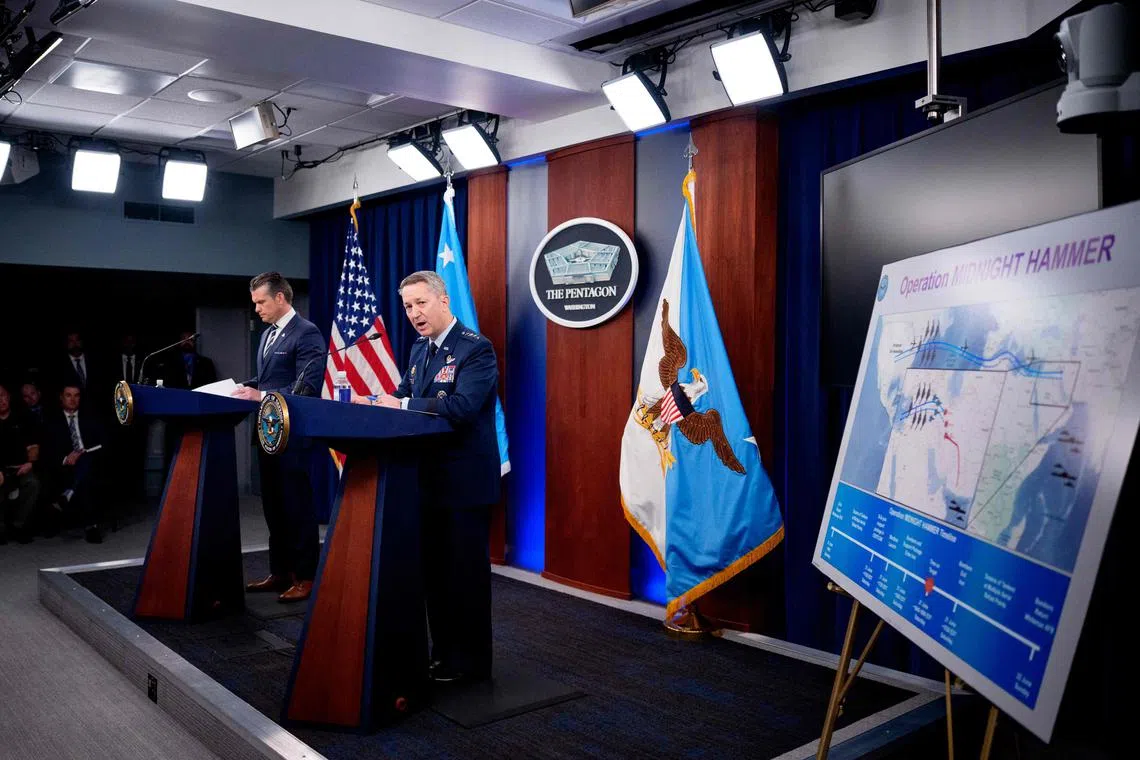Around military bases in the US, unease over what comes next
Sign up now: Get ST's newsletters delivered to your inbox

The past few days have served as a solemn reminder of the unsettling emotions military service can bring.
PHOTO: AFP
WASHINGTON – For some families who gathered this weekend at Fort Benning in Georgia, the past few days have served as a solemn reminder of the unsettling emotions military service can bring.
On June 20, a group of army enlistees graduated from basic training. On June 21, US President Donald Trump bombed Iran
On June 22, service members and their loved ones pondered an uncertain future.
“People can lose their life, so I’m worried,” said Ms Michele Bixby, 24, of upstate New York, whose brother had just graduated.
“But it’s what he wanted to do; it’s what he loves to do. He’s going to move forward with it no matter what.”
One day after the administration announced it had carried out airstrikes at three nuclear sites in Iran, the mood in some communities around military bases on US soil varied from firm support to bitter disagreement. But one sentiment stood out among those interviewed: concern for the safety of America’s troops everywhere.
No one knows how the strikes on Iran could affect service members.
Mr Pete Hegseth, the secretary of defence, emphasised on June 22 that the administration did not want an open-ended war.
But Iranian leaders have vowed to retaliate, and US military installations in the Middle East, with more than 40,000 active-duty troops and civilians employed by the Pentagon, are already potential targets.
That reality, along with the potential repercussions for the entire military, was on the minds of many people around US bases at home, even as service members accepted that reality as part of the job.
“A lot of the families around here are quickly realising this is a real threat; this is something we need to be worried about,” said Ms Meghan Gilles, 37, a self-described military brat who works in the Army Reserve’s human resources division at Fort Campbell in Kentucky, a training site and home to the 101st Airborne Division.
At Eglin Air Force Base in Florida, Blake Carlson, a 23-year-old Army National Guard combat medic who was visiting from Austin, Texas, said that he could be deployed.
“It’s what I signed up for,” he said. “If I have to, I’ll do it.” But his mother and brother hoped the country would not be dragged into the escalating conflict in the Middle East.
Some people who were interviewed stood by Mr Trump and agreed with his assertions that the targeted bombings were unlikely to lead to a wider conflict. Mr Carlson’s mother, Ms Tonya Carlson, said she hoped the attack would force Iran to negotiate with the US.
Others stood by Mr Trump’s statement that Iran posed an imminent threat – a point that contradicts recent national security assessments. “Iran doesn’t need to have nuclear weapons, for sure,” said Mr Tony Saluzzo, 72, a former combat engineer who served in the US offensive against Iraq and lives near Fort Campbell.
Mr James Arthur, a 42-year-old retired coast guard captain who lives north of Tampa, Florida, and was visiting the Air Force Armament Museum at the Eglin base, said that the Iran air strikes happened “about two decades too late”.
Other former service members castigated Mr Trump for bombing Iran without congressional approval. The Constitution’s framers included language to ensure that wars would not be entered rashly, said Mr Paul Oyler, a navy veteran who served in Iraq and Afghanistan and who lives near the Naval Air Station Lemoore in California, where he was based while on active duty.
He said he would have agreed with the air strikes if there were a proven, credible threat to the region, but that “I don’t have any reason to believe that Iran was in possession of actual nuclear weapons”.

Mr Denver Thiery, 30, who works on military maintenance contracts and lives in Trenton, Kentucky, near Fort Campbell, said he would remain firmly behind Mr Trump. But he also acknowledged that it was difficult to know exactly what capabilities Iran possessed.
“I don’t know the truth of what’s going on,” he said. “I don’t know if they really have nuclear warheads or not. I don’t know what I can support anymore.”
Ms Meghan Gilles, the reservist, whose father is a veteran and whose husband is an active-duty serviceman, was troubled by the decision to edge the country to war at the very moment the government was cutting funding for Veterans Affairs.
The administration is taking away a lot of benefits for veterans and “then just sending them off again to be the world police”, Ms Gilles said.
If the current conflict worsens, military members and veterans said, they would put aside their disagreements over Mr Trump and support one another. But one veteran lamented what he said such a scenario would ultimately mean.
“I learnt from my time on active duty that war is devastating,” Mr Oyler, the navy veteran, said. NYTIMES


